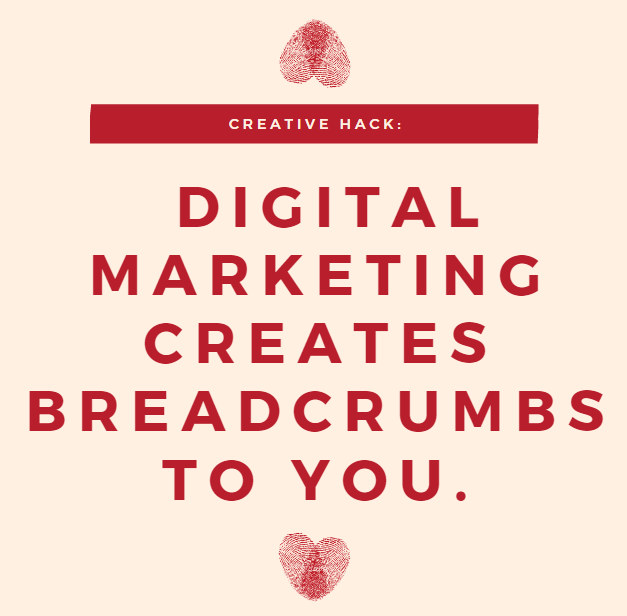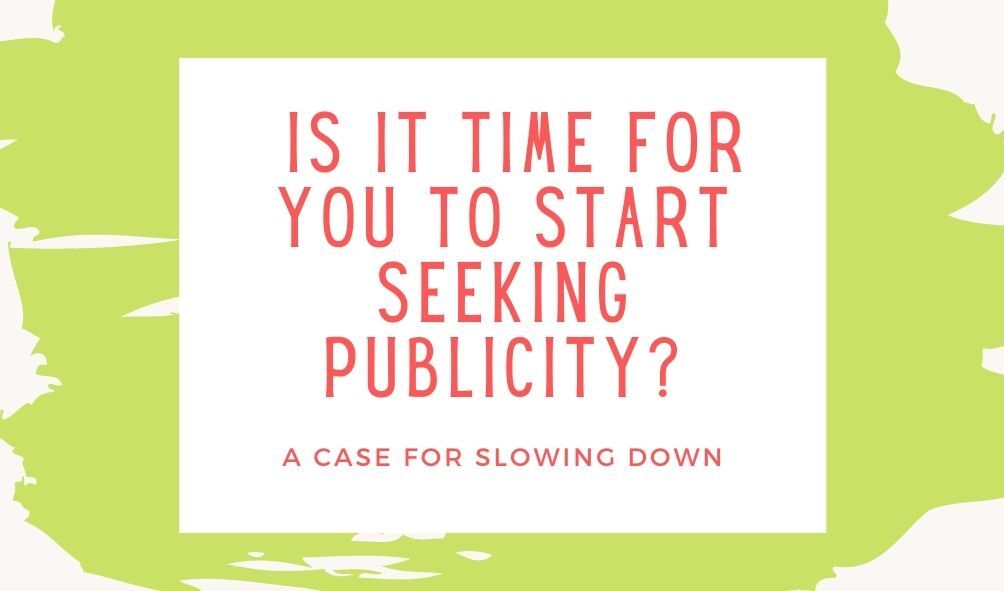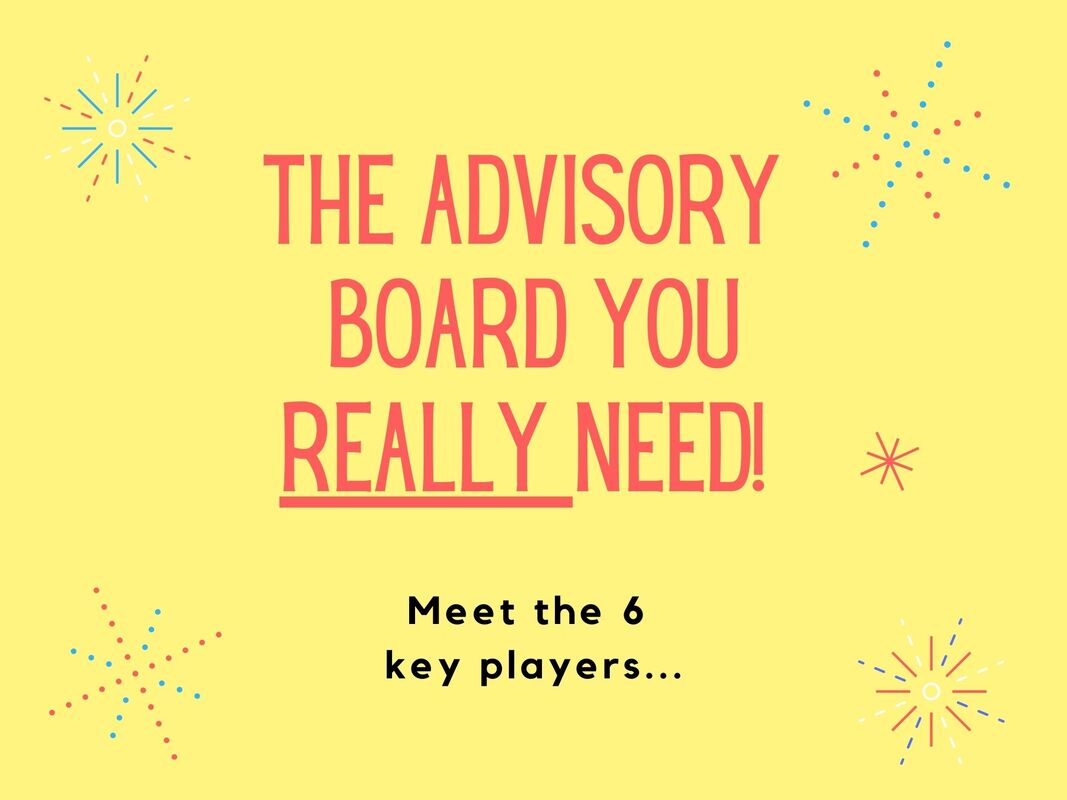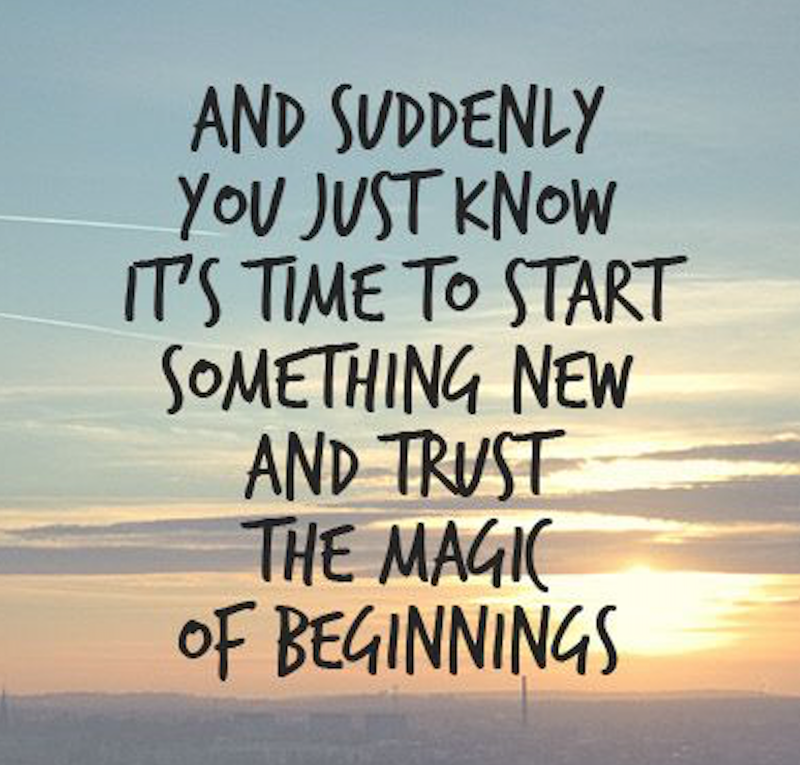|
It used to be that creatives made content, revised it, and released it into the wild. A marketing team might help promote it if you were lucky. Then it became incumbent on creatives to start promoting our work on our social media, and now—should we have a blog/website of our own—we need to also be skilled in SEO optimization, creating conversions, and analyzing metrics. If you're thinking, "Ew, gross," I get it. That’s not what most of us want to focus on. I’ve found it helpful to think of SEO (Search Engine Optimization) as more of a matchmaker or dating app. Digital-marketing tools are there to help us attract an audience who is a good fit, plain and simple. Think of "key words," in particular, as breadcrumbs to you. When we supply “key words” (the words we anticipate people might type into their search bar to find content like ours), we leave a trail of breadcrumbs for our potential audience to find us and get to know us better. It’s like posting a profile on a dating app. You can have the most appealing profile in the world but who cares if no one can see it—or if it’s only viewed by people who already know us? The majority of us want more like-minded people to know we're out here and available for mingling (content-wise, obviously). If we didn't want to be noticed, we wouldn't make our work public. It's on us to stay genuine and not try to “game the system.” I think where a lot of creatives, including myself, get turned off is by the idea of establishing marketing tools ahead of the actual content we create. If you’re thinking about which engaging key words to use, or optimizing titles, more than you are thinking about the ideas you want to express, game over. Back to the dating-app metaphor: You don’t want to spend more time anticipating what potential suitors might want in a date at the expense of expressing who you really are. Digital marketing brings you a bigger pool of suitors who already connect with you on at least some level. Metrics are there to help us, not insult us. Lastly, metrics, like a good matchmaker, keep it real. Numbers don’t lie, and it’s important to know if people are visiting your site and reading your stories (also, are they skimming for 10 seconds and moving on, or spending several minutes)? In the dating-app metaphor, wouldn’t you want to know if people weren’t reaching out to you after checking out your profile for some small reason? What if you could easily fix it; wouldn't you want to make some adjustments and try again? The same is true with metrics; they give us a chance to figure out how we’re going wrong in finding potential readers/viewers so we can make our breadcrumbs more relevant and enticing. We creatives don’t have to fall in love with digital marketing anymore than we'd be expected to fall in love with the matchmaker. We can be willing to experiment with it, learn from it, and possibly even appreciate its value. If you like this, check out "3 Questions to Ask Before Seeking Publicity for Your Project"
1 Comment
Recently, an Executive Director of a newly formed nonprofit asked me how to go about getting publicity for his new youth-empowerment program. I asked him where he was in the process, and he told me he was piloting the program in a few weeks. He wanted to start getting press now though to raise funding. This made no sense to me (except for the fear of running out of money, a pressure every ED faces). “I think before worrying about publicity, it's better to focus on piloting the program and making the program as strong as possible,” I suggested. "Right," he said, "but what about getting publicity?" The next week, a filmmaker asked me how she could get her short video to go viral. I told her that no one can really predict what will go viral. What we can do is try to create something that is really good first. She smiled and wanted to talk more about going viral. I understand intimately the feeling of urgency to get the spotlight on my work. I’ve lived and breathed the anxiety that comes from craving validation that my work is as good as I hope; a need for funding so I will be able to continue the work I love; and the race to get my idea out there before someone beats me to it. It doesn’t help that we live in a culture obsessed with buzz. Success is linked with being featured on media outlets, discussed on Twitter (better if you get your own hashtag), and being offered a TED talk. All this anxiety creates a hunger for publicity before the project is even done (but it’s so close, right?!). If you feel this is happening to you, recognize it. Take some deep breaths, and let yourself know you’re where you are supposed to be. How will you know it’s truly time to go after publicity? Here are the questions I recommend asking yourself: 1. Are you done with the project? It sounds practically old-fashioned but it's our job to focus on the work, first and foremost. Spend the time you need on it until you can say that you’ve given it your all (perfectionists, I see you, and you have to let go at some point). Then, share it with a small group of people whose opinion you respect. I’m not talking about family and friends who will say it’s great because they love you. Find a small focus group of people, ideally in your industry, who can speak knowledgably. If you have a personal advisory board, this is a good time to rely on them. Stay as open as possible as you listen to their feedback, even if it’s hard to hear. Wait until you can be objective, and then incorporate the changes you know will make the project better. This make take one round, or a few rounds. It may slow things down but you get one chance to launch. Note: I've been told that it's important to generate a lot of buzz before my projects got released. This doesn't make sense to me unless you already have a large devoted audience following you already. If I am excited about someone’s project, I want to see or experience it right away. In this oh-so-noisy world, I don’t want to have to try to remember when it will be released. It’ll be gone from my brain by then. There should be some active step an audience can take.
2. Can you define your own version of success? Before releasing your project into the world, ask yourself what success will look like for YOU. Many of us dream of awards, front-page news, glowing testimonials and bestseller lists. There’s nothing wrong with aiming high but ask yourself if there are other alternatives of success. I love making projects that inspire people to pursue their own paths rather than getting trapped into what society deems acceptable. Yes, it was always my aim to reach many thousands of people with each project but I also felt it would be worthwhile if I were to change the lives of many dozens of people in a substantial way. What do you need to happen in order to qualify your project as worthwhile? Write that down before you launch so you don't lose sight of it. Have you celebrated completing your vision? As Kerry David, my co-director on our documentary SEEKING HAPPILY EVER AFTER told me, you get only one chance to create something exactly as you intended it and have it belong to you. Once you release it into the world, it is no longer truly yours. People will have their own edit suggestions, interpretations and opinions, and it is no longer yours in the same way. Presumably you didn’t begin making your project for someday publicity. Whether you get excellent feedback from the outside world or not…celebrate the fact that you finished a project that was meaningful to you. Take a victory lap for being willing to see your creation through and put your ideas out there. Soak in the joy, toast yourself, buy yourself a swank takeout dinner. If and when you can answer yes to all these questions, you’re likely ready to pursue publicity. Of course, you'll need a concrete publicity plan with a schedule, pre-written emails, and list of contacts with email addresses. It's not just a wing and a prayer. You'll need a good combination of high-octane coffee and daily yoga or meditation. This part of the journey can make even the most confident feel vulnerable and exposed. Hopefully, you’ll get shout-outs galore. But do trust word of mouth. When a project is good, others want to see it. Don't you? If your topic is compelling and resonates with people, it will find its way. In the meantime, keep celebrating the hard and beautiful work you did in creating something meaningful. If you like this you might enjoy:
Also, if you have an AVERSION to self-promotion, I highly recommend this read by Amanda Hirsch of Mighty Forces. When founders are asked whether they have an “advisory board,” they often cringe because it’s one more thing to set up and manage on an overflowing to-do list. When it was brought to my attention, I pictured weeks, maybe months, of tracking down the “right” roles: lawyer, marketing expert, finance person, etc. But what I found when starting my nonprofit was that there was a different kind of advisory board that I needed first, a dream team of people who could support me when I was feeling isolated and doubtful (which was often). For any of you in the start-up trenches, here are the roles I found the most necessary, and I'd be curious to hear yours. My advisory-role suggestions include the person who:
So how do you recruit your picks? Do you know who you'd pick for you dream team? Start taking down some notes. Play around with the role, and when you're ready...ask them. Be candid about what you’re looking for, why you chose them and what exactly it will mean for them in terms of responsibility. It might sound something like this: “Hey, Aunt Megan, I’m realizing that being a founder can be pretty lonely, and I could use someone to cheer me on when I meet big goals. I’m assembling my dream team time of advisors, and you’re the best cheerleader I know. Would you be willing to be this person for me? It would mean that when I have a victory, I can call or email you so we can celebrate together?" If she is confused, you can add, "It may sound weird to formalize this process, but I think having this advisory board in place will give me the confidence I need to keep going.” Hopefully Aunt Megan says yes. If she says no, she wasn’t the right person so go ahead and rethink this one. It doesn't mean she doesn't believe in you. It just means she isn't right for the role. Note: Some people may be worried about how much time they can commit, so be clear on the ask. They need to know you’re not going to be calling round the clock (also, don't call them round the clock). It's okay if it takes you time to get your advisory board in place. Don’t wait until you have all six to launch. You can move forward with two or three, and keep your eyes open for new team members to add on. If someone committed but isn't the right fit, ask someone else. You may find there are other roles you need, or that you only need a few. This is YOUR board so the most important thing is to make it work for you. Dole out gratitude regularly to your board. People agree to advise because they want to make a difference in someone's life. You don't have to send extravagant gifts. Let them know how they were helpful to you, and propelled you forward. Lastly, take mental notes on everything you learn about this process, and be an advisor for someone else someday. If you like this you might enjoy:
Are You Celebrating the Tiny Wins with Your Family & Staff Why Starting a Business is a Whole Lot Like Tubing Last week, I announced that I'd be stepping down as Executive Director of MEDIAGIRLS. I know this was surprising to many of the people in my world. I get it. It's weird when founders leave because they almost always bring such an abundance of passion to the nonprofit they start (why else would you go through all that effort if you didn't feel strongly about the cause?). Many of you asked me what's next, and how I'm feeling about this transition. First, thank you for caring, and I figured I'd answer all of you who inquired at once. As for what's next, I'm not sure yet. I'm in the process of interviewing for jobs in which I will NOT be the leader but rather a team player. I want to bring my love of storytelling and creating content to help heal this broken world while continuing to empower others. Here's my job wishlist if any of you are curious. Is it crazy to leave a job when you don't have another one lined up, especially in this economy? Probably. But I've always trusted my gut, and it's served me well (minus those cringey embarrassing moments, but those always make for the best stories). As for how I'm feeling about the transition, I feel joyful. Keep in mind that I made the decision to step down last fall so I've had plenty of time to process the multitude of intense feels. I also believe that one of the best things a founder can do is know when it's time to go, and make sure that there's a strong plan in place for the hand-off. It's time. Sidenote: If you ever create your own business, do not call it your "baby." You can't imagine how many times people labeled MEDIAGIRLS my baby, and I even came to believe it for several years. If you buy into this common notion, you will also believe that no one can really take care of your "baby" other than you. It's YOU that has to stay up at all hours feeding the crying baby and paying endless attention to it and not getting a break and feeling alone. Do yourself a favor and consider it a business that you care deeply about, and surround yourself with the right people to grow it. That brings me to gratitude. I'm feeling full of it, for the wise, supportive, board who has always had my back, and for Amanda Mozea, our Education Outreach Manager, who brings so much attention to detail, challenges me in the best ways, and helped make our programming deeper and more substantial for the brown and black girls we serve. She brings the fire, and has an even softer heart than she knows. I'm thankful for the volunteers, mentors, donors, and cheerleaders who helped MEDIAGIRLS inspire thousands of girls along the way to use their voice to speak up and learn to advocate. I love this village so much, and am excited to watch the next leg of the journey. I'm grateful that I had the opportunity to lead an organization based on the values I care most deeply about: empowering other people to do their best work rather than micromanaging; collaborating instead of competing; expressing gratitude for the gifts and kindnesses offered; being transparent even when you don't feel like it; asking for help; and building solid relationships. I made my fair share of humbling mistakes along the way, but I don't believe I lost sight of my values.
The universe did me a solid in bringing on Angela Scott as our Interim Executive Director. Angela has been such a pivotal part of the MEDIAGIRLS staff for several years, and taught me to be a more strategic and organized thinker. She shares my overall values, and brings her own set of unique talents to expand MEDIAGIRLS. She is warm and funny, and one of my favorite people. So here's to being grateful for what we have, continuing to adjust and take risks, staying true to our own values and having faith in the magic of new beginnings. Please connect with me at LinkedIn if you'd like to stay in touch. |
THE COVEMichelle Cove is a journalist, filmmaker, author, and founder of the nonprofit MEDIAGIRLS. She uses storytelling and media to encourage, challenge, empower and inspire others and is seeking a job that allows her to put these skills to use; check out her resume if you may know the right fit. Michelle's favorite stories involve resilience, a blend of soft humility and sharp humor, and a belief that the universe is conspiring to help us all grow. Find her at LinkedIn. Also find her on
Archives
February 2021
Categories
All
|








 RSS Feed
RSS Feed
